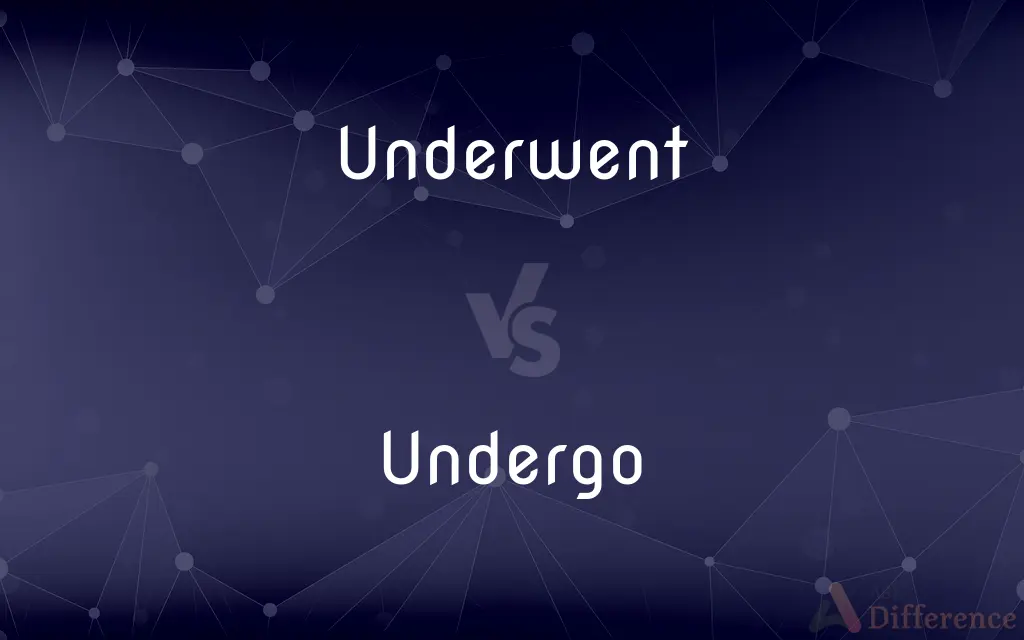Underwent vs. Undergo — What's the Difference?
Edited by Tayyaba Rehman — By Urooj Arif — Updated on March 26, 2024
"Underwent" is the past tense of "undergo," indicating an experience or process completed in the past, while "undergo" suggests a current or future experience.

Difference Between Underwent and Undergo
Table of Contents
ADVERTISEMENT
Key Differences
The distinction between "underwent" and "undergo" also highlights the aspect of time in relation to the subject's experience. "Underwent" explicitly places the experience in the past, providing a clear indication that the subject has already faced or completed the process described. This can be useful in narratives, reports, or any context where the timing of events is crucial.
"Undergo," being in the present or infinitive form, offers flexibility in discussing experiences that are ongoing, imminent, or hypothetical. This can be particularly relevant in medical, technical, or scientific contexts where processes or treatments are being planned or discussed currently.
The usage of these terms can subtly affect the tone and focus of a statement. "Underwent" often carries a sense of completion and possibly reflection, as it looks back on experiences that have already shaped the subject. "Undergo," conversely, tends to look forward or consider the current state, which can evoke a sense of anticipation, preparation, or ongoing engagement with the process in question.
In terms of grammatical structure, both "underwent" and "undergo" can be used in various sentence constructions, but their tense determines compatibility with other temporal expressions within the sentence. "Underwent" will be paired with other past-tense verbs or time indicators, while "undergo" might be used with future constructions ("will undergo") or present continuous ("is undergoing").
Comparison Chart
Tense
Past
Present/Future
ADVERTISEMENT
Usage
Describes a completed process or experience.
Describes an ongoing or future process.
Example Context
Reflecting on past events or conditions.
Discussing current conditions or future plans.
Example Sentence
"She underwent surgery last year."
"He will undergo a medical examination tomorrow."
Implication
Implies completion and possibly reflection.
Suggests anticipation, preparation, or engagement.
Compare with Definitions
Underwent
Past tense of "undergo," indicating a completed experience or process.
She underwent a major transformation last summer.
Undergo
Describes a current or future experience, process, or treatment.
The city will undergo major changes in the next decade.
Underwent
Used to describe past actions, especially in medical or scientific contexts.
The patient underwent several tests to determine the diagnosis.
Undergo
Used for discussing plans or expectations for processes.
The proposal is set to undergo a review process next week.
Underwent
Reflects on experiences that have already happened.
The building underwent renovations in 2010.
Undergo
Reflects a state of current engagement or imminent action.
The policy is currently undergoing revisions to address concerns.
Underwent
Common in narratives and reports detailing past activities.
The software underwent significant updates before release.
Undergo
Indicates the action of being subjected to something.
Patients must undergo a screening before the treatment.
Underwent
Highlights a sense of completion and reflection on past events.
The team underwent extensive training for the project.
Undergo
Suggests anticipation or preparation for an upcoming event.
The device is undergoing final tests before its launch.
Underwent
Past tense of undergo.
Undergo
To experience or be subjected to
A person who underwent great difficulty.
A house that is undergoing renovations.
Undergo
(transitive) To experience; to pass through a phase.
The project is undergoing great changes.
Undergo
(transitive) To suffer or endure; bear with.
The victim underwent great trauma.
She had to undergo surgery because of her broken leg.
Undergo
To go or move under or beneath.
Undergo
To go or move below or under.
Undergo
To be subjected to; to bear up against; to pass through; to endure; to suffer; to sustain; as, to undergo toil and fatigue; to undergo pain, grief, or anxiety; to undergothe operation of amputation; food in the stomach undergoes the process of digestion.
Certain to undergo like doom.
Undergo
To be the bearer of; to possess.
Their virtues else, be they as pure as grace,As infinite as man may undergo.
Undergo
To undertake; to engage in; to hazard.
I have moved alreadySome certain of the noblest-minded RomansTo undergo with me an enterprise.
Undergo
To be subject or amenable to; to underlie.
Claudio undergoes my challenge.
Undergo
Of mental or physical states or experiences;
Get an idea
Experience vertigo
Get nauseous
Undergo a strange sensation
The chemical undergoes a sudden change
The fluid undergoes shear
Receive injuries
Have a feeling
Undergo
Go or live through;
We had many trials to go through
He saw action in Viet Nam
Undergo
Accept or undergo, often unwillingly;
We took a pay cut
Common Curiosities
Can "underwent" and "undergo" be used interchangeably?
No, "underwent" and "undergo" cannot be used interchangeably because they refer to different time frames (past vs. present/future).
How is "undergo" used in a sentence?
"Undergo" is used to describe the action of experiencing or being subjected to a process, condition, or treatment, either currently or in the future.
What type of experiences can one undergo?
One can undergo medical treatments, transformations, reviews, tests, and various other processes or experiences.
Is "underwent" only used in medical contexts?
While "underwent" is often used in medical contexts, it can also refer to any significant process or transformation experienced in the past.
What does "underwent" mean?
"Underwent" is the past tense of "undergo," referring to a process or experience that was completed in the past.
What is the future tense of "undergo"?
The future tense of "undergo" is formed with "will" as in "will undergo."
How does tense affect the use of "underwent" and "undergo" in storytelling?
Tense choice affects the timeline of events; "underwent" places actions in the past, while "undergo" situates them in the present or future, influencing the narrative flow.
Is there a perfect tense form of "undergo"?
Yes, the perfect tense forms include "has undergone" or "had undergone," indicating completed actions at a specific time in the past or up to the present.
Can "undergo" be used in passive voice?
Yes, "undergo" can be used in passive voice, e.g., "The procedure will be undergone by the patient."
Can "undergo" imply an ongoing process?
Yes, "undergo" can imply an ongoing process, especially when used in present continuous form (e.g., "is undergoing").
How do "underwent" and "undergo" differ in terms of reflection and anticipation?
"Underwent" often implies reflection on past experiences, while "undergo" suggests anticipation or current engagement with a process.
Are there phrases commonly associated with "undergo"?
Yes, phrases like "undergo a transformation" or "undergo treatment" are common.
Can "undergo" be used without specifying what is being undergone?
It's grammatically possible but usually lacks clarity unless the context is already clear from the conversation or text.
What is a synonym for "underwent"?
"Experienced" or "endured" can serve as synonyms for "underwent" in certain contexts.
Share Your Discovery

Previous Comparison
Hat vs. Hut
Next Comparison
Robust vs. VigorousAuthor Spotlight
Written by
Urooj ArifUrooj is a skilled content writer at Ask Difference, known for her exceptional ability to simplify complex topics into engaging and informative content. With a passion for research and a flair for clear, concise writing, she consistently delivers articles that resonate with our diverse audience.
Edited by
Tayyaba RehmanTayyaba Rehman is a distinguished writer, currently serving as a primary contributor to askdifference.com. As a researcher in semantics and etymology, Tayyaba's passion for the complexity of languages and their distinctions has found a perfect home on the platform. Tayyaba delves into the intricacies of language, distinguishing between commonly confused words and phrases, thereby providing clarity for readers worldwide.















































